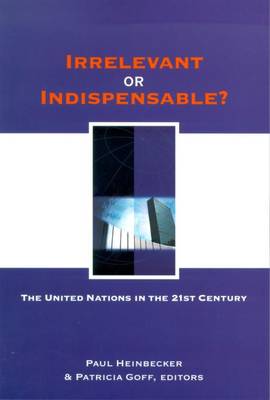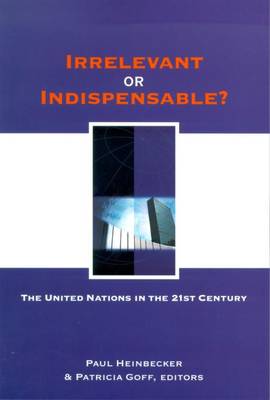
- Retrait gratuit dans votre magasin Club
- 7.000.000 titres dans notre catalogue
- Payer en toute sécurité
- Toujours un magasin près de chez vous
- Retrait gratuit dans votre magasin Club
- 7.000.0000 titres dans notre catalogue
- Payer en toute sécurité
- Toujours un magasin près de chez vous
Irrelevant or Indispensable?
The United Nations in the Twenty-First Century
Description
Suffering from a divided membership, the United Nations is at a crossroads, unable to assure human or national security. The UN has been criticized as irrelevant by its most--and least--powerful members alike because it can't reach consensus on how to respond to twenty-first-century challenges of global terrorism, endemic poverty, and crimes against humanity.
Secretary General Kofi Annan has proposed a package of sweeping reforms that would safeguard the rule of law, outlaw terrorism, protect the innocent from abusive governments, reduce poverty by half, safeguard human rights, and enlarge the Security Council. Intended to reinvigorate the institution and galvanize its members into action, his proposals are extensive and innovative, courageous and controversial.
This volume assembles the perspectives of current practitioners, leading academics, civil society representatives, and UN officials on transforming the secretary general's proposed reforms into action. Their assessments are frank and their views varied, but they do agree on one thing--the United Nations must be made more effective precisely because it is indispensable to the promotion of economic development and collective security in the twenty-first century.
Co-published with the Centre for International Governance Innovation
Spécifications
Parties prenantes
- Editeur:
Contenu
- Nombre de pages :
- 210
- Langue:
- Anglais
- Collection :
Caractéristiques
- EAN:
- 9780889204935
- Date de parution :
- 22-06-05
- Format:
- Livre broché
- Format numérique:
- Trade paperback (VS)
- Dimensions :
- 152 mm x 226 mm
- Poids :
- 340 g

Les avis
Nous publions uniquement les avis qui respectent les conditions requises. Consultez nos conditions pour les avis.





